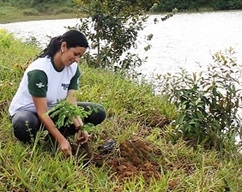For the Conservation of Natural Resources
Organized in cooperatives, farmers keep the compromise to adopt sustainable practices
5 de August de 2013
Organized in cooperatives, farmers keep the compromise to adopt sustainable practices
5 de August de 2013

Caring for the environment and conserving natural resources in a systematic and integrated way generates significant results for everyone. This is the thinking of the members of the Bahia State Manioc Starch Producers’ Cooperative (COOPAMIDO), with head office in the municipality of Laje, located 103 kilometers from the capital city Salvador.
“Since it was created four years ago, COOPAMIDO has assumed the premise of complying with environmental law and operating based on a sustainable business model, one which adds productivity and social responsibility,” said Jairo Souza, President of the cooperative, which is associated with the Bahia Southern Lowlands Environmental Protection Area Mosaic Program for Development and Growth Integrated with Sustainability (PDCIS), supported by the Odebrecht Foundation and public and private partners.
Environmental Partnerships
Seeking to promote the generation of jobs and income, COOPAMIDO establishes partnerships with farmers from Laje and from surrounding municipalities to encourage the leasing of their lands to the local farmers, aiming to recover the degraded pastures. These farmers then use the lands to grow manioc and deliver the roots to the cooperative. At the Bahiamido processing industry, the manioc root is transformed into starch, a component used by industries of different kinds.
In order to be a part of this process and be benefitted, the farmers must develop actions of an environmental character, such as reforestation and the recovery of water sources. Besides this, the partner comes to work as a multiplier. “We did not develop any practice focused on the Environment in the region,” explained cooperative member Marceli Andrade, a resident of the community of Cruzeiro in Laje. “With the installation of COOPAMIDO, we began to view this as a commitment and replicate the knowledge for the rural producers in my community,” she reported.
At six partner farms that are directly associated with COOPAMIDO, 800 hectares of legal reserve are maintained, where 84 water sources were being recovered or protected. “We want to offer people opportunities to develop their activities, taking conservation practices as a reference,” said Jairo Souza. “It works like a daily educational process, one focused on promoting changes in the region,” he said.
According to Alan Sousa, responsible for the cooperative’s environmental pillar, conservation ensures that the manioc planting areas are better used. “The forest that surrounds the crops guarantees the presence of the natural enemies of pests and reduces the risk of the transmission of diseases,” said Sousa. “The plantations are managed using practices that help increase the flow from the water sources,” he said.
In order to apply knowledge and operate pursuant to law, COOPAMIDO also receives the support of the Brazilian Institute of the Environment and Renewable Natural Resources (IBAMA), the Bahia State Public Prosecutor’s Office (representation in the municipality of Santo Antônio de Jesus) and the Federal University of the Recôncavo of Bahia.
Do you wish to be
a partner in our projects, make
a donation or hire our technical consulting?
Send a message
right now!